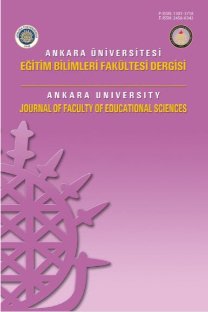PISA 2009 Okuma Becerileri Yeterliklerinin Sosyoekonomik Alt Yapı ve Okul Öncesi Eğitime Katılım Açısından İncelenmesi Türkiye Örneği
An Investigation of the PISA 2009 Reading Literacy in Terms of Socio-Economical Backgrounds and Receiving Pre-School Education Turkey Example
___
- Agresti, A. (1996). An Introduction to Categorical Data Analysis. USA: John WileyandSons, Inc.
- Airasian, P. W. (1994). Classroom Assessment. New York: McGraw-Hill.
- Büyüköztürk, Ş., Çakmak, E., Akgün, Ö. E., Karadeniz, Ş. & Demirel, F. (2008). Bilimsel Araştırma Yöntemleri. (2. Baskı). Ankara: Pegem A Yayıncılık.
- Çakan, M. (2003). Geniş Ölçekli Başarı Testlerinin Eğitimdeki Yeri ve Önemi. Eğitim ve Bilim, Cilt 1(3), 26-38.
- Dağlı, S. (2007). Okul Öncesi Eğitimi Alan ve Almayan İlköğretim Birinci Sınıf Öğrencilerinin Akademik Başarılarının Karşılaştırılması. Selçuk Üniversitesi Sosyal Bilimler Enstitüsü, Yayımlanmamış Yüksek Lisans Tezi, Konya.
- Erbay, E. (2008). Okul Öncesi Eğitim Alan ve Almayan İlköğretim Birinci Sınıf Öğrencilerinin Sosyal Becerilere Sahip Olma Düzeyleri. Pamukkale Üniversitesi Sosyal Bilimler Enstitüsü, Yayımlanmamış Yüksek Lisans Tezi, Denizli.
- ERG. (2013). Türkiyede Matematikve Fen Bilimleri Alanlarında Öğrenci Performansı ve Başarının Belirleyicileri: TIMSS 2011 Analizi.
- Web:http://erg.sabanciuniv.edu/node/1172, İnternetten 1 Ekim 2013 tarihinde elde edilmiştir.
- Fındık, L.Y. & Kavak, Y. (2013). Türkiyedeki Sosyoekonomik Açıdan Dezavantajlı Öğrencilerin PISA 2009 Başarılarının Değerlendirilmesi. Kuram ve Uygulamada Eğitim Yönetimi [Educational Administration: Theory and Practice], 19(2), 249-273.
- Finn-Stevenson, M., Desimone, L. & Chung, A. (1998).Linking Child Care Support Service with the School: Pilot Evaluation of the School of the 21st Century. Web: http://www.yale.edu/bushcenter/ 21C/pdf/article2.pdf, İnternetten 30 Mart 2011 tarihinde elde edilmiştir .
- Gilmore, A. (2005). The Impact of PIRLS (2001) and TIMSS (2003) in Low- and Middle-Income Countries: An Evaluation of The Value of World Bank Supportfor International Surveys of Reading Literacy (PIRLS) and Mathematics and Science (TIMSS). Web: http://www.iea.nl/fileadmin/user_upload/Publications/Electronic_versions/Gil more_Impact_PIRLS_TIMSS.pdf, Retrived October 1, 2013, from.
- Gürsakal, S. (2012). PISA 2009 Öğrenci Başarı Düzeylerini Etkileyen Faktörlerin Değerlendirilmesi. Süleyman Demirel Üniversitesi İktisadi ve İdari Bilimler Fakültesi Dergisi, 17(1), 441-452.
- Haladyna, T. M. (1997). Writing Test Itemsto Evaluate Higher Order Thinking. USA: Allynand Bacon.
- IEA. (2013). TIMSS and PIRLS 2011: Relationships Among Reading, Mathematics, and Science Achievement at the Fourth Grade-Implications for Early Learning. Boston: IEA Publishing.
- Karasar, N. (2007). Bilimsel Araştırma Yöntemi. (17. Baskı). Ankara: Nobel Yayın Dağıtım.
- Kennedy, A. M., Mullis, I. V. S., Martin, M. O. & Trong, K. L. (2007). PIRLS 2006 Encyclopedia: A Guide to Reading Education in the Forty PIRLS 2006 Countries. Web: http://timssandpirls.bc.edu/PDF/P06Encyclopedia.pdf, Retrived October 1, 2013, from.
- Kılıç, Z. (2008). İlköğretim Birinci Sınıf Öğretmenlerinin Görüşlerine Göre Okul Öncesi Eğitim Alan ve Almayan Öğrencilerin Gelişim Becerilerinin Karşılaştırılması. Beykent Üniversitesi Sosyal Bilimler Enstitüsü, Yayımlanmamış Yüksek Lisans Tezi, İstanbul.
- Kulm, G. (1994). Mathematics Assessment: What Works in the Classroom. San Francisco: Jossey-Bass Publications.
- McCullagh, P. & Nelder, J. A. (1989). Generalized Linea rModels (2nd Edition). Chapmanand Hall.
- MEB. (2000). Türk Milli Eğitim Sistemi. İstanbul, Araştırma, Planlama ve Koordinasyon Kurulu Başkanlığı. Web: http://www.meb.gov.tr, İnternetten 09 Mart 2011 tarihinde elde edilmiştir.
- MEB. (2003). PIRLS 2001 Ulusal Rapor. Web: http://egitek.meb.gov.tr/dosyalar/dokumanlar/uluslararasi/pirls_2001_ulusal_ra poru.pdf, İnternetten 09 Mart 2011 tarihinde elde edilmiştir.
- MEB. (2008). Mesleki Eğitim ve Öğretim Sisteminin Güçlendirilmesi Projesi. Erken Çocukluk Eğitiminde Temel İlkeler. Ankara, Milli Eğitim Bakanlığı Basımevi.
- MEB. (2010a). PISA 2006 Ulusal Nihai Rapor. Web: http://earged.meb.gov.tr/pisa/dokuman/2006/rapor/Pisa_Ulusal_Nihai_Rapor.p df, İnternetten 21 Mart 2011 tarihinde elde edilmiştir.
- MEB. (2010b). PISA 2009 Ulusal Ön Rapor. Web: http://earged.meb.gov.tr/ pisa/dokuman/2009/rapor/Pisa_Ulusal_Ön_Rapor.pdf, İnternetten 21 Mart 2011 tarihinde elde edilmiştir.
- OECD. (2009). PISA 2009 Assessment Framework - Key Competencies in Reading, Mathematics and Science. Paris: OECD Publishing.
- OECD. (2010a). PISA 2009 Results: What Students Knowand Can Do-Studen tPerformance in Reading, Mathematics and Science. Paris: OECD Publishing.
- OECD. (2010b). PISA 2009 Results: OvercomingSocial Background-Equıty in Learning Opportunitie sand Outcomes. Paris: OECD Publishing.
- OECD. (2010c). PISA 2009 Results: Learning to Learn-Student Engagement, Strategies an dPractices. Paris: OECD Publishing.
- OECD. (2010d). PISA 2009 Results: What Makes a School Successful? Resources, Policies and Practices. Paris: OECD Publishing.
- OECD. (2010e). Against The Odds:Disadvantaged Students Who Succeed In School. Paris: OECD Publishing.
- OECD. (2011). Does Participation in Pre-Primary Education Translate Into Better Learning Outcomes at Schools?. PISA in Focus. Web: http://www.pisa.oecd.org/dataoecd/37/0/47034256.pdf. Retrived April 13, 2011, from.
- Özdamar, K. (1997). Paket Programlar ile İstatistiksel Veri Analizi. Eskişehir: Anadolu Üniversitesi Yayını.
- Popham, W. J. (2000). Modern Educational Measurement: Practical Guidelines for Educational Leaders. (3rd Edition). Boston: Allyn and Bacon.
- Ryan, J. & Keir, S. (2008). The Status of Large-scale Assessment in the Pacific Region. (REL Technical Brief, REL 2008-No. 003). Washington: U.S. Department of Education, Institute of Education Sciences, National Center for Education Evaluation and Regional Assistance, Regional Educational Laboratory Pacific. Web: http://ies.ed.gov/ncee/edlabs, Retrived March 28, 2011, from.
- Schulz, W. (2005). Measuring the Socio-Economic Background of Students and Its Effect on Achievement in PISA 2000 and PISA 2003. Paper prepared for the Annual Meeting of the American Educational Research Association.
- Sürmen, Y. G. (2011). Türk Milli Eğitiminde Örgün Eğitimin Yeri ve Okul Öncesi Eğitim. Beykent Üniversitesi Sosyal Bilimler Enstitüsü, Yayımlanmamış Yüksek Lisans Tezi, İstanbul.
- ISSN: 1301-3718
- Yayın Aralığı: Yılda 3 Sayı
- Başlangıç: 1968
- Yayıncı: ANKARA ÜNİVERSİTESİ (EĞİTİM BİLİMLERİ FAKÜLTESİ)
Araştırma Görevlilerinin Bilim ve Bilimsel Etkinliklere İlişkin Algılarının Karşılaştırmalı Analizi
Nuri KARA, Murat DUMAN, Neşe SEVİM, Soner YILDIRIM
Mantıksal Deneyimsel Düşünme Ölçeğinin Uyarlanması: Geçerlik ve Güvenirlik Çalışması
Paraprofesyoneller İçin Küçük Adımlar Erken Eğitim Programı Kursu: Kursiyerler Ne Söylüyor?
Bülbin SUCUOĞLU NİMET, Dolunay SARICA AYŞE, Hatice BAKKALOĞLU, Bahar KEÇELİ-KAYSILI
Ergenlere Yönelik Müdahale Programlarına Genel Bir Bakış
Mustafa TÜRKMEN, Figen ÇOK, Neslihan G.KARAMAN, Hülya ERCAN
7. Sınıf Öğrencilerinin İspata Yönelik Becerilerinin İrdelenmesi1
Ortaokul Öğrencileri İçin Konuşma Kaygısı Ölçeği: Geçerlik ve Güvenirlik Çalışması
Tazegül DEMİR, Deniz MELANLIOĞLU
4+4+4 Yapılanması Kapsamında Hazırlanan Uyum ve Hazırlık Çalışmaları Kitaplarının Değerlendirilmesi
F.dilek GÖZÜTOK, Özgür ULUBEY, Ayşe Gülsüm AKÇATEPE, Ece KOÇER, M. Emir RÜZGÂR
